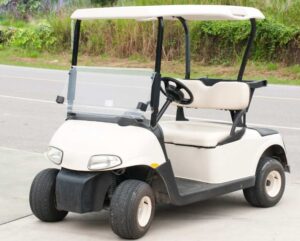When you’re cruising down the fairway or zipping between holes on the golf course, you might not think much about the weight of your trusty golf cart. However, understanding the weight of a golf cart can be more important than you realize, influencing everything from safety to course maintenance. So, let’s delve into the world of golf cart weights and explore why it matters.
we will explore:
- How Much Does a Golf Cart Weigh?
- How much does a battery-powered golf cart weigh
- How much does a 2,4 and 6 seater gas golf cart weigh?
- How to Determine the Weight of a Golf Cart
How Much Does a Golf Cart Weigh?

Most golf carts weigh between 800 and 1,100 pounds, although some lighter models can come in around 500 pounds and heavier ones can reach up to 1,300 pounds. The weight can depend on several factors, such as the number of seats, the material used in the frame, and whether it’s gas-powered or electric. Electric carts tend to be a bit heavier because of the batteries.
How much does a golf car weigh in kg?
You can easily convert the weight of a golf cart from pounds to kilograms using a conversion factor. Here’s how:
-
Find the weight in pounds: As we discussed earlier, typical golf cart weights range from:
- Electric: 600 – 1,000 pounds
- Gas: 800 – 1,200 pounds
- You can find the specific weight for your model by checking the manufacturer’s manual or contacting them directly.
-
Conversion factor: There are 2.2048 kilograms in 1 pound.
-
Calculation: To convert the weight from pounds (lbs) to kilograms (kg), multiply the weight in pounds by the conversion factor (2.2048).
For example, let’s say a gas golf cart weighs 1,000 pounds:
- Weight in kilograms (kg) = Weight in pounds (lbs) x Conversion factor (kg/lb)
- Weight in kg = 1,000 lbs * 2.2048 kg/lb
- Weight in kg = 2,204.8 kg (approximately)
Here’s a table summarizing the weight range of golf carts in kilograms:
| Golf Cart Type | Weight Range (lbs) | Weight Range (kg) |
|---|---|---|
| Electric | 600 – 1,000 | 272.16 – 453.59 (kg) |
| Gas | 800 – 1,200 | 362.87 – 544.31 (kg) |
How much does a battery-powered golf cart weigh?
Battery-powered golf carts typically weigh between 600 and 1,000 pounds, with the exact weight depending on the specific model and its features. Here’s a breakdown of factors affecting the weight of an electric golf cart:
- Battery size and type: Larger battery packs, like those in 48V systems, will add more weight than smaller 36V packs. Lithium-ion batteries are lighter than traditional lead-acid batteries.
- Number of seats: A two-seater electric golf cart will naturally weigh less than a six-seater one.
- Cart frame material: Aluminum frames are lighter than steel frames.
- Additional features: Extras like a stereo system, light bars, or a fold-down rear seat will increase the overall weight.
If you’re considering buying a battery-powered golf cart, it’s important to consult the manufacturer’s specifications to determine the exact weight. This information is crucial for towing and trailer considerations.
How much does a 2,4 and 6 seater gas golf cart weigh?
Here’s an estimated weight range for gas golf carts depending on the number of seats:
- 2 seater: 800 – 950 pounds
- 4 seater: 900 – 1,050 pounds
- 6 seater: 1,000 – 1,200 pounds
Gas golf carts are generally lighter than electric carts because they don’t have heavy battery packs. However, the exact weight can still vary depending on the specific make and model, as well as features like:
- Frame material: Aluminum frames are lighter than steel frames.
- Tires and wheels: Larger wheels and heavier-duty tires will add weight.
- Accessories: Extras like a stereo system, light bars, or a fold-down rear seat will increase the overall weight.
It’s important to consult the manufacturer’s specifications to determine the exact weight of a particular gas golf cart model you’re interested in. This information is crucial for towing and trailer considerations.
Read also: How Much Are Golf Carts?
Factors Affecting Golf Cart Weight
The weight of a golf cart is influenced by various factors, ranging from its power source to its construction materials. Understanding these factors is essential for golfers and manufacturers alike. Here are the key factors affecting golf cart weight:
1. Power Source:
- Electric vs. Gasoline: Golf carts can be powered by electric batteries or gasoline engines. Electric carts tend to be heavier due to the weight of the batteries, while gasoline carts are generally lighter.
2. Battery Type and Size:
- Battery Capacity: The size and capacity of the batteries significantly impact the weight of electric golf carts. Larger batteries with higher capacities contribute to increased weight.
- Battery Chemistry: Different battery chemistries, such as lead-acid or lithium-ion, have varying densities and weights, affecting the overall weight of the cart.
3. Cart Size and Model:
- Passenger Capacity: Larger carts designed to accommodate more passengers or cargo will naturally weigh more than smaller models.
- Frame and Chassis: The material and design of the frame and chassis contribute to the overall weight of the cart. Steel frames are heavier than aluminum or composite materials.
4. Material of Construction:
- Frame Material: Golf carts can be constructed from various materials, including steel, aluminum, fiberglass, and composite materials. Each material has its weight characteristics, influencing the overall weight of the cart.
- Body Panels: The material used for body panels and components, such as roofs, seats, and cargo beds, also affects the cart’s weight. Fiberglass and plastic panels are lighter than their metal counterparts.
5. Accessories and Additions:
- Customization: Additional features and accessories added to the golf cart, such as custom seats, roofs, windshields, and storage compartments, increase its weight.
- Cargo Load: Carrying heavy items or cargo in the cart’s storage compartments can add significant weight, affecting performance and battery life in electric carts.
6. Tire Size and Type:
- Wheel and Tire Configuration: Larger wheels and tires designed for off-road use or enhanced traction add weight to the golf cart. Additionally, pneumatic tires filled with air weigh more than solid or foam-filled tires.
7. Motor and Drivetrain Components:
- Motor Size: The size and power output of the electric motor or gasoline engine influence the weight of the cart. Larger motors and drivetrain components contribute to increased weight.
- Transmission: The type of transmission system, whether electric or mechanical, also affects the cart’s weight. Complex transmission systems may add weight but offer improved performance.
8. Suspension System:
- Suspension Components: The design and components of the suspension system, including springs, shocks, and axles, contribute to the overall weight of the cart. Heavy-duty suspension systems designed for rough terrain may add weight.
Average Weight of Golf Carts
On average, golf carts can weigh anywhere from 500 to 1,000 pounds or more. Electric carts tend to be heavier due to the weight of their batteries, with weights ranging from 900 to 1,300 pounds. Gas-powered carts are generally lighter, with weights typically falling between 500 and 800 pounds.
Popular models like the Yamaha Drive2 weigh approximately 535 pounds without batteries, while the Club Car Precedent electric model comes in at around 925 pounds with batteries included.
Importance of Knowing Golf Cart Weight

Understanding the weight of a golf cart is crucial for several reasons, extending far beyond simply knowing how heavy it is. Here’s why knowing the weight of a golf cart is important:
1. Safety Considerations:
- Overloading a golf cart beyond its weight capacity can compromise its stability and increase the risk of accidents, especially on uneven or hilly terrain.
- By knowing the weight of the cart, golfers can ensure they adhere to weight limits and distribute weight evenly to maintain stability during operation.
2. Transportation and Storage:
- Knowing the weight of a golf cart is essential for safely transporting it on trailers or trucks. Exceeding weight limits during transportation can damage vehicles and pose safety hazards.
- Proper storage of a golf cart also requires consideration of its weight to prevent structural damage to floors, ramps, or shelves.
3. Course Restrictions:
- Many golf courses have weight restrictions for carts to protect the turf and prevent damage to delicate grasses, particularly on courses with sensitive grass varieties or in wet conditions.
- Golfers need to be aware of these restrictions to avoid penalties or fines and to preserve the quality of the course for future play.
4. Environmental Impact:
- The weight of golf carts can impact the environment, particularly on courses with delicate ecosystems. Heavier carts exert more pressure on the turf, leading to compaction and soil degradation.
- Electric carts, although heavier due to their batteries, have lower emissions and contribute less to air and noise pollution compared to gas-powered models, making them a more environmentally friendly option.
5. Cost of Ownership:
- The weight of a golf cart can influence its maintenance requirements and operating costs. Heavier carts may require more frequent maintenance, such as replacing tires and batteries, leading to higher expenses over time.
- Additionally, the weight of a golf cart can affect its fuel efficiency and energy consumption, impacting operational costs for gas and electric models respectively.
How to Determine the Weight of a Golf Cart

There are a couple of ways to determine the weight of a golf cart:
1. Check the manufacturer’s manual or specifications:
This is the most accurate and reliable way to find out the weight of your golf cart. The manual will usually list two weights:
Dry weight: This is the weight of the cart itself without any fluids, batteries, or accessories.
Curb weight: This is the total weight of the cart with all fluids, batteries, and standard accessories included
2. .Contact the manufacturer directly:
If you don’t have the owner’s manual, you can contact the golf cart manufacturer directly and inquire about the weight of your specific model. They should be able to provide you with the dry weight and curb weight.
3. Weighing the golf cart:
This method is less accurate but can be an option if you can’t find the weight information from the manufacturer. You’ll need access to a weighbridge that can handle the weight of the cart. Here’s what to do:
-
-
- Find a weighbridge at a truck stop or weigh station.
- Ensure the cart is empty of passengers and cargo.
- Drive the cart onto the weighbridge and follow the instructions for obtaining a weight reading.
-
Important points to remember:
- The weight listed in the manual or by the manufacturer is usually the curb weight, which includes the battery and essential parts.
- If your cart has additional accessories, those will add to the overall weight.
- Be aware of the weight limitations for bridges, trailers, or elevators when transporting your golf cart.
Implications of Golf Cart Weight
The weight of golf carts can have several implications:
Impact on course maintenance: Heavier carts exert more pressure on the turf, potentially causing damage to delicate grasses, especially in wet or soft conditions.
Environmental considerations: Electric carts, while heavier, have lower emissions and contribute less to air and noise pollution compared to gas-powered models.
Cost of ownership: Heavier carts may require more maintenance and upkeep, such as replacing tires and batteries more frequently, leading to higher operating costs over time.
Conclusion
The weight of a golf cart is not just a trivial detail—it can have significant implications for safety, course maintenance, and overall ownership experience. By understanding the factors that influence golf cart weight and its importance, you can make informed decisions when purchasing, operating, and maintaining your golf cart.
FAQs:
- Can I increase the weight capacity of my golf cart?
- While it’s not recommended to exceed the manufacturer’s weight capacity, you can consult with a professional to explore options for increasing the cart’s capacity safely.
- Do lighter golf carts perform better on the course?
- Lighter carts may offer better maneuverability and efficiency, especially on courses with steep hills or tight turns.
- Are there regulations regarding golf cart weight on public roads?
- Yes, many jurisdictions have regulations governing the weight and specifications of golf carts allowed on public roads, including maximum speed limits and weight restrictions.
- How often should I check the weight of my golf cart?
- It’s a good idea to periodically check the weight of your golf cart, especially if you’ve made modifications or added accessories that could affect its weight.
- Can I reduce the weight of my golf cart by removing accessories?
- Removing unnecessary accessories or cargo can help reduce the weight of your golf cart, but be sure not to compromise safety or functionality in the process.






